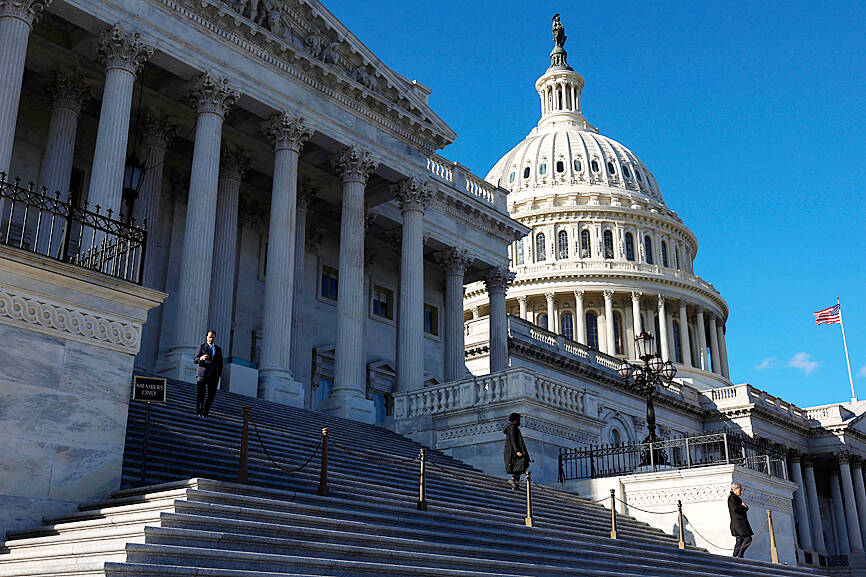The Ministry of Foreign Affairs yesterday thanked the US House of Representatives for advancing the Taiwan International Solidarity Act in a rebuff to Beijing’s claims over the nation.
The bill, which aims to amend the 2019 Taiwan Allies International Protection and Enhancement Initiative (TAIPEI) Act, passed the House by a unanimous voice vote on Tuesday.
The legislation would require the US to support Taiwan’s bids to join international organizations as specified under the TAIPEI Act and oppose attempts by Beijing to “resolve Taiwan’s status by distorting the decisions, language, policies or procedures” of such organizations.

Photo: AFP
The bill states that UN Resolution 2758 — which recognized the People’s Republic of China as the sole legitimate government of China in 1971 — does not apply to Taiwan.
“The resolution did not address the issue of representation of Taiwan and its people in the United Nations or any related organizations, nor did the resolution take a position on the relationship between [China] and Taiwan or include any statement pertaining to Taiwan’s sovereignty,” it said.
“The United States opposes any initiative that seeks to change Taiwan’s status without the consent of the [Taiwanese] people,” the bill added.

Photo: CNA
The bill must still be approved by the US Senate, and then signed by US President Joe Biden before it can become law.
The Ministry of Foreign Affairs said in a news release that Taipei welcomed the US House’s advancement of a bill that could help counter China’s malign efforts to thwart Taiwan’s participation in international organizations.
Beijing over the past decades has repeatedly invoked Resolution 2758 as a means to prevent Taiwan from participating in and contributing to the international community in a distortion of the resolution’s purpose, which was concerned solely with China’s legal representation, it said.
The Chinese Communist Party’s “one China” principle is based on Beijing’s false interpretation of the resolution and the lies it made to the international community, the ministry added.
The ministry thanked the friends of Taiwan across the political divide in the US Congress, saying that Taiwan would continue its collaboration with the US and other like-minded countries in overcoming shared global challenges.
Democratic Progressive Party (DPP) Legislator Wang Ting-yu (王定宇) said the bill was a clear signal to the international community that Resolution 2758 should not be applied to Taiwan.
Promoting this fact would allow the nation to create a legal foundation for Taiwan to achieve membership in international organizations and normal interactions with global political actors, he said.
The US House’s passage of the Taiwan International Solidarity Act shows that an unprecedented level of support for the nation’s bid to join the UN exists in Washington, DPP Legislator Chao Tien-lin (趙天麟) said.
Chinese Nationalist Party (KMT) Legislator Charles Chen (陳以信) said the bill’s importance should not be overplayed, as the Taiwan-US relationship continues to be largely governed by the same legal framework as before.
Although the importance of the bill is more symbolic than substantial, the KMT still welcomes and appreciates the US Congress’ expressions of goodwill, Chen said.

MAKING WAVES: China’s maritime militia could become a nontraditional threat in war, clogging up shipping lanes to prevent US or Japanese intervention, a report said About 1,900 Chinese ships flying flags of convenience and fishing vessels that participated in China’s military exercises around Taiwan last month and in January last year have been listed for monitoring, Coast Guard Administration (CGA) Deputy Director-General Hsieh Ching-chin (謝慶欽) said yesterday. Following amendments to the Commercial Port Act (商港法) and the Law of Ships (船舶法) last month, the CGA can designate possible berthing areas or deny ports of call for vessels suspected of loitering around areas where undersea cables can be accessed, Oceans Affairs Council Minister Kuan Bi-ling (管碧玲) said. The list of suspected ships, originally 300, had risen to about

DAREDEVIL: Honnold said it had always been a dream of his to climb Taipei 101, while a Netflix producer said the skyscraper was ‘a real icon of this country’ US climber Alex Honnold yesterday took on Taiwan’s tallest building, becoming the first person to scale Taipei 101 without a rope, harness or safety net. Hundreds of spectators gathered at the base of the 101-story skyscraper to watch Honnold, 40, embark on his daredevil feat, which was also broadcast live on Netflix. Dressed in a red T-shirt and yellow custom-made climbing shoes, Honnold swiftly moved up the southeast face of the glass and steel building. At one point, he stepped onto a platform midway up to wave down at fans and onlookers who were taking photos. People watching from inside

Japan’s strategic alliance with the US would collapse if Tokyo were to turn away from a conflict in Taiwan, Japanese Prime Minister Sanae Takaichi said yesterday, but distanced herself from previous comments that suggested a possible military response in such an event. Takaichi expressed her latest views on a nationally broadcast TV program late on Monday, where an opposition party leader criticized her for igniting tensions with China with the earlier remarks. Ties between Japan and China have sunk to the worst level in years after Takaichi said in November that a hypothetical Chinese attack on Taiwan could bring about a Japanese

STREAMLINED: The dedicated funding would allow the US to transfer equipment to Taiwan when needed and order upgraded replacements for stockpiles, a source said The US House of Representatives on Thursday passed a defense appropriations bill totaling US$838.7 billion, of which US$1 billion is to be allocated to reinforcing security cooperation with Taiwan and US$150 million to replace defense articles provided to the nation. These are part of the Consolidated Appropriation Act, which the US House yesterday passed with 341 votes in favor and 88 against. The act must be passed by the US Senate before Friday next week to avoid another government shutdown. The US House Committee on Appropriations on Monday unveiled the act, saying that it allocates US$1 billion for the Taiwan Security Cooperation Initiative